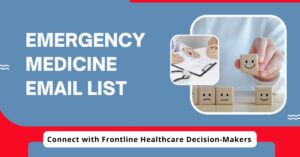Marketing to hospitals and healthcare providers has always been complex. With multiple decision-makers, strict regulations, and high stakes, it’s crucial for marketers to deliver precise, value-driven messaging. That’s where accurate physician data becomes a game-changer.
In an environment where relevance is everything, having up-to-date, detailed physician profiles can significantly improve marketing outcomes—boosting reach, engagement, and conversion rates.
1. Why Physician Data Is Essential in Healthcare Marketing
Physicians play a critical role in hospital purchasing decisions—from medical devices and pharmaceuticals to software solutions and diagnostic tools. Understanding who they are, what they specialize in, and how they practice is the first step to building meaningful relationships.
Accurate physician data typically includes:
-
Full name, NPI number, and credentials
-
Specialization and subspecialties
-
Hospital affiliations
-
Geographic location and contact info
-
Prescribing patterns or procedural volume
-
Referral networks and influence mapping
2. Benefits of Using Verified Physician Data
Here’s how accurate data can transform your marketing strategy:
a. Precision Targeting
Rather than broad outreach, marketers can segment their audience by specialty, practice size, or geography—ensuring messages land with the right physicians at the right time.
b. Higher Engagement Rates
Personalized messaging tailored to a physician’s interests and needs gets more traction than generic content. A cardiologist, for example, will engage more with messages about cardiovascular devices than general clinical tools.
c. Improved Sales Conversion
By aligning sales outreach with verified physician data, reps can prioritize high-value targets who are more likely to influence purchasing decisions.
d. Better ROI on Campaigns
With cleaner, more segmented lists, your cost per lead (CPL) decreases, and campaign performance improves. Accurate data reduces waste and enhances efficiency.
3. Applications Across Marketing Channels
Accurate physician data supports multiple marketing efforts:
-
Email Campaigns: Personalized content by specialty or location
-
Digital Ads: Geo-targeted or behavior-based campaigns
-
Events & Webinars: Tailor invites to relevant physicians based on specialty
-
CRM & Lead Scoring: Sync data with CRM tools for better nurturing
4. Common Challenges in Physician Data Management
-
Outdated or incomplete records: Physicians frequently change affiliations or contact details.
-
Data silos: Information may be spread across various systems.
-
Lack of integration: Difficult to sync physician data with CRM, marketing platforms, or sales systems.
That’s why partnering with a verified data provider or investing in centralized, regularly updated databases is essential.
5. Building a Smarter Marketing Strategy
Here’s how you can put physician data to work:
-
Conduct a data audit and clean your lists
-
Segment by specialty, hospital system, or practice location
-
Build value-based messaging tailored to specific needs
-
Track response rates and continuously optimize your outreach
Conclusion:
Marketing to hospitals doesn’t have to be hit or miss. With accurate physician data, you can connect with the right people, craft better campaigns, and achieve higher impact. In today’s competitive healthcare landscape, data isn’t optional—it’s a strategic asset.







